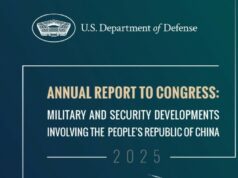To avoid steep U.S. tariffs, Vietnam is ready to clamp down on Chinese goods being rerouted through its territory to the United States and plans to strengthen oversight of sensitive exports to China, according to a source familiar with the situation and a government document reviewed by Reuters.
Vietnam offered incentives to ease U.S. concerns over Chinese goods falsely labeled as “Made in Vietnam” to avoid tariffs. Despite these efforts, the Trump administration imposed a 46% tariff as part of a broader trade crackdown.
While the tariff has been suspended for 90 days, the two countries agreed to start talks after a Vietnamese deputy prime minister met with the U.S. Trade Representative on Wednesday.
Crackdown On Trade Fraud
Vietnam, heavily reliant on exports, is seeking to reduce U.S. tariffs to between 22% and 28%, based on signals from a March bilateral meeting, according to sources. Neither Vietnam’s trade ministry nor the U.S. Trade Representative’s office commented.
In announcing the start of trade talks with the U.S. on Thursday, Vietnam’s government said on its official portal it would crack down on “trade fraud”. It did not provide specifics.
Since Trump’s first term, many multi-national firms have implemented a “China plus one” policy of setting up factories in Vietnam to reduce exposure to Beijing.
Walking A Tightrope
The Southeast Asian nation is in a tight spot as it tries to preserve trade with the U.S., which is its largest export market and a security partner. At the same time, Hanoi does not want to antagonize China, which is a top source of investment as well as a neighbour with which it has clashed over boundaries in the South China Sea.
Vietnam’s Government Office, a body that coordinates between its ministries, held an emergency meeting with government trade experts on April 3, hours after Trump announced the tariffs. The aim was to address Washington’s concerns over alleged intellectual property theft and transhipment abuses, according to a person briefed on the meeting.
At the meeting, Vietnamese trade and customs officials were instructed to draft a plan within two weeks to curb illicit transhipment, with a possible extension to late April. Hanoi is proceeding cautiously to avoid straining ties with China.
Vietnam’s Government Office and the customs department did not respond to a request for comment.
Conduit
Many of the goods exported by Vietnam to the West have Chinese-made inputs, and Chinese companies have also established factories in the country to serve U.S. customers.
In many instances, Vietnamese workers process the goods, which are then legally shipped to the U.S. under a “Made in Vietnam” label.
Official trade data show Vietnam’s exports to the U.S. in recent years have been fuelled by imports from China, with inflows from Beijing closely matching the value and swings of exports to Washington.
U.S. officials have alleged, however, that China uses Vietnam as a conduit to obtain lower tariffs for goods that do not have significant Vietnamese involvement.
“China uses Vietnam to tranship to avoid the tariffs,” Navarro said on Fox News on April 6, without providing evidence.
A person familiar with the matter said that in some instances, ships carrying Chinese-made goods dwelled in Vietnamese ports just long enough to obtain documents certifying that the products were made in Vietnam before leaving.
Reuters could not immediately establish if Vietnam’s offer was enough to address U.S. concerns over abuse of transhipment or if the country could comprehensively tackle the problem.
A spokesperson for China’s Foreign Ministry said in response to Reuters’ question that trade between Beijing and Hanoi “is essentially a win-win situation. We believe that Vietnam will make a choice that is in line with its own long-term interests and the overall situation of mutually beneficial cooperation between China and Vietnam”.
Chips, Satellites And Planes
Vietnam is planning stricter controls on sensitive goods, such as dual-use items like semiconductors, that pass through its territory from the U.S. to China. A draft decree, prepared at the trade ministry’s request and reviewed by Reuters, outlines these measures, with an explanatory note dated April 4.
The document said that major trading partners had requested that Hanoi “minimize the possibility of these source technologies being transferred to third countries without the consent of the exporting country”.
The U.S. government considers leadership on artificial intelligence as a national priority and Washington has moved to cut off China’s access to the most advanced U.S.-made chips.
Vietnam now plans to introduce new declaration and approval procedures for the trade of such products, according to the proposal.
Hanoi previously said that it discussed controls over exports of dual-use goods with U.S. officials during meetings in March.
Other tech-related gestures directed at the U.S. include Hanoi’s approval, under favourable conditions, for the Starlink satellite communication service controlled by Trump’s billionaire ally Elon Musk.
Elon Musk signaled Starlink’s expansion plans in Vietnam by reposting a Reuters article about upcoming ground stations. Beijing views Musk’s growing space presence as a threat and is racing to launch its own satellites.
Meanwhile, Vietnam is balancing relations with major powers, preparing to host Chinese President Xi Jinping next week. His visit may coincide with Vietnam approving China’s COMAC jets, potentially boosting their foreign sales.
This follows recent deals by Vietnamese airlines to secure U.S. loans for buying Boeing aircraft.
(With inputs from Reuters)





